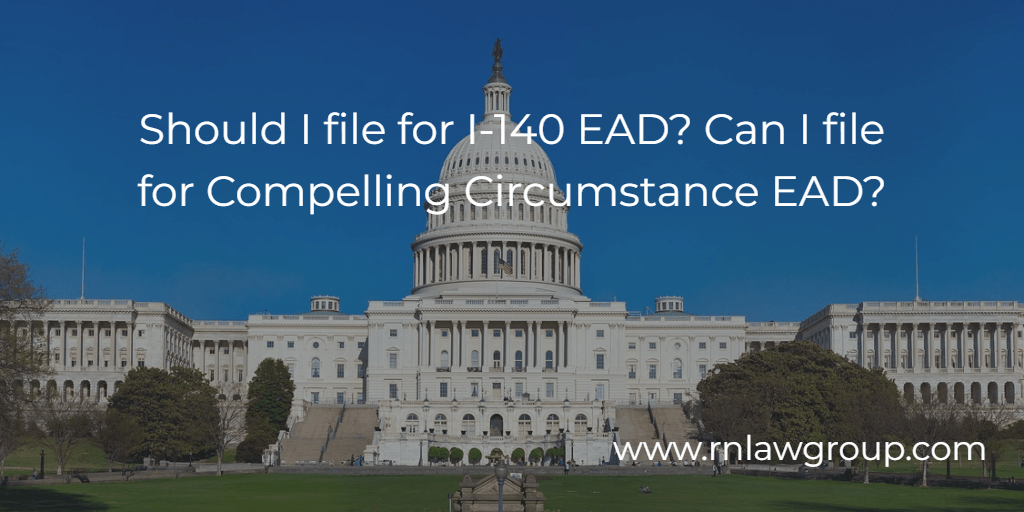
Should I file for I-140 EAD? Can I file for Compelling Circumstance EAD?
USCIS has the authority to issue work authorizations (EAD) in cases of compelling circumstances for eligible individuals and their dependent spouses and dependent children. To meet the bare minimum criteria to file for a compelling circumstance EAD, the principal applicant/individual must: 1) hold the primary beneficiary status of an approved I-140 (EB1, EB2, or EB3) petition 2) without an immediately available green card i.e. no current priority date, 2) present in the United States under E-3, H-1B, H-1B1, L-1, or O-1 nonimmigrant status or an applicable grace period. Crucially, USCIS will evaluate whether the principal applicant can demonstrate truly compelling circumstances warranting the issuance of a compelling circumstance EAD.
From the advent of COVID-19 pandemic subsequent economic downturn, there was an enormous growth in the number of individuals and families seeking compelling circumstance EADs. While the pandemic has subsided and the economy navigates its way through inflation and supply chain issues, USCIS has continued to approve and extend compelling circumstance EADs. In so many ways, the current Biden administration has been immensely friendly to immigrants recognizing the historical cultural and economic value added by these communities.
For those interested in filing for the I-140 or Compelling Circumstance EAD, it’s critical that individuals understand 1) the qualifications necessary for obtaining compelling circumstance EADs for the Applicant and their families, and 2) the real-world consequences of acquiring and sustaining residency in the United States via the submission and/or endorsement of a compelling circumstance EAD.
How and when do I Apply? What is the filing fee?
You must file a Form I-765 before the expiration of your current non-immigrant status (i.e. E-3, H-1B, H-1B1, L-1, or O-1 nonimmigrant status), including any applicable grace period, with a selection of category C(35) for principal applicant and C(36) for qualifying dependent spouse and/or child. USCIS requires a filing fee of $520 for each EAD filing.
I got laid off. Can I still file for the I-140 or Compelling Circumstance EAD?
The answer is most likely. One must file the I-765 for compelling circumstances either 1) before the expiration of the current non-immigrant visa OR 2) within any applicable grace period. Typically after a job loss, USCIS will allow a 60-day grace period whereby they will still consider the person in status for purpose of filing a non-immigrant visa transfer/amendment, a non-immigrant change of status, and/or filing for the I-140 Compelling Circumstance EAD.
Let’s assume for sake of example that a person is on H-1B and is laid off on January 1. They would have until March 1 (Jan. 1 plus 60 days) to file a non-immigrant visa transfer/amendment, a non-immigrant change of status, and/or file for the I-140 Compelling Circumstance EAD.
How long does the EAD last? How long is processing? Can I renew I-140 or Compelling Circumstance EAD?
The EAD will be valid for one-year from the date of approval, not the date of filing. Processing times always fluctuate but at the time of writing, we are seeing approvals within about 4 months.
Additionally, the principal beneficiary may seek renewals of this employment authorization for the principal beneficiary and qualifying dependent spouse and children in 1-year increments if 1) absent a current priority date, compelling circumstance still exists or, 2) the difference between the principal beneficiary’s priority date and the relevant Final Action Date is 1 year or less (without having to show compelling circumstance). If filing for a compelling circumstance EAD extension, the compelling circumstance does not have to be the same compelling circumstance as that for the first or any prior compelling circumstance EAD approval.
Does a compelling circumstance EAD give me legal status? If not, how will it impact my ability to change status or re-enter the United States?
Obtaining a compelling circumstance EAD does not confer legal status. In fact, working under this authorization typically terminates your current legal status, as USCIS views you as no longer adhering to the terms of your non-immigrant visa. However, individuals granted a compelling circumstance EAD will be considered to be in a period of authorized stay and will not accumulate unlawful presence during the validity or processing of a legitimate compelling circumstance EAD application.
One obvious outcome of receiving a compelling circumstance EAD is the permission to remain and work in the United States during the authorized stay period. However, a less evident consequence is that although you can lawfully work and be present, you do not hold a legal non-immigrant status. Consequently, individuals with a compelling circumstance EAD cannot apply for adjustment of status, whether it’s for an immigrant or non-immigrant visa. To regain legal immigrant or non-immigrant status, individuals must depart the United States in a timely manner for consular processing. This departure serves as a “refresh” to their legal status.
What types of compelling circumstance does the government consider?
Generally, USCIS will consider four categories of compelling circumstances: 1) Serious illness or disability faced by the nonimmigrant worker or his or her dependent; 2) employer retaliation against the nonimmigrant worker, 3) other substantial harm to the applicant; and 4) significant disruption to the employer.
Most often, an individual will file under 1) serious illness or disability faced by the nonimmigrant worker or his or her dependent or 2) other substantial harm to the applicant.
The decision to file the I-140 or Compelling Circumstance EAD is not one to be taken lightly. It is imperative that anyone interested in filing for the I-140 or Compelling Circumstance EAD fully understand the benefits and consequences of the program. We have had clients utilize this type of EAD since its inception in the Obama administration and it has provided a immeasurably positive benefit to those individuals, their employers, and the American public.
For more information, or for a detailed conversation regarding eligibility for an I-140 or Compelling Circumstance Employment Authorization Document (EAD) application, I invite you to schedule a time to speak here.
By Ryan A. Wilck, Partner and Attorney at Law
Ryan Wilck is a Managing Partner and attorney at Reddy & Neumann, P.C. with over a decade of US immigration law experience, enthusiastic and proactive in his approach assisting clients and their employees through the various phases of the permanent residency a/k/a Green Card process. “Concilio et labore” is not only the motto of Ryan’s favorite sports club but is also his life’s motto; all things come through wisdom and effort. Ryan is passionate about gaining the trust of his clients by utilizing a relentless and detail-oriented approach to understand their specific goals and concerns, hoping to instill a sense of confidence and stability. Whatever your immigration problem or interest, he and his team will find a solution, through wisdom and effort. Reddy & Neumann, P.C. has been serving the business community for over 20 years and is Houston’s largest immigration law firm focused solely on employment-based business immigration. We work with employers and their employees, helping navigate the complex immigration process efficiently and cost-effective.
We are committed to assisting our clients with navigating the complex PERM Labor Certification (ETA 9089 and other challenging immigration matters as an accomplished immigration law firm in Houston, Texas. Our team is here to offer the direction and support you require, whether you’re a company trying to hire top talent or a foreign worker seeking to develop a career in the United States. To find out more about how we can help you with your immigration issues, get in touch with us right away.

